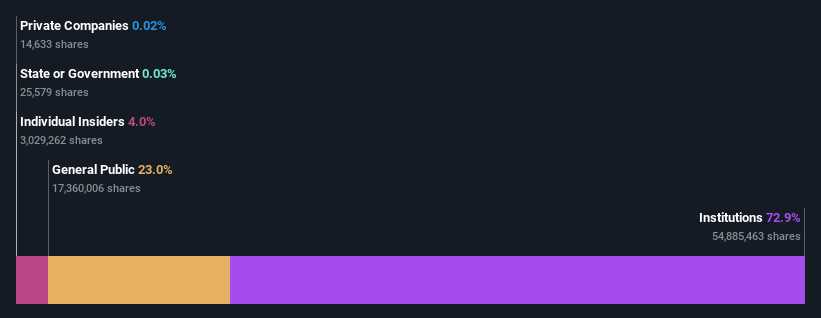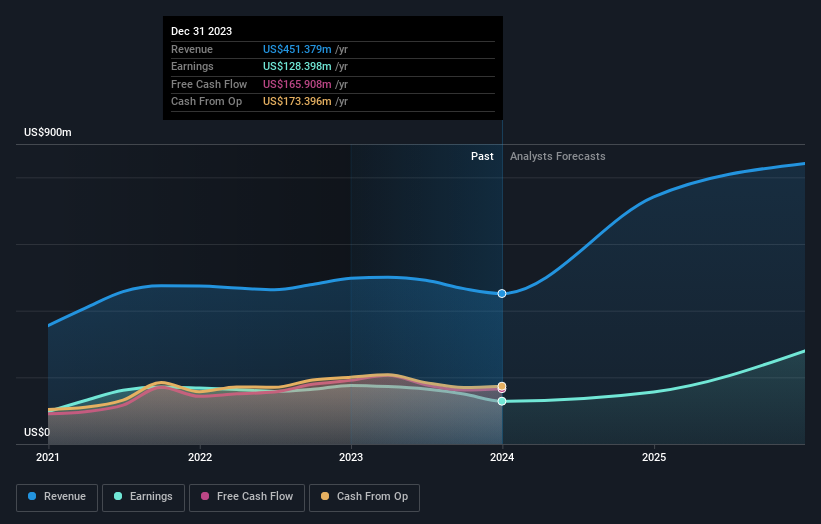Stock Analysis
- United States
- /
- Banks
- /
- NYSE:PFS
After losing 18% in the past year, Provident Financial Services, Inc. (NYSE:PFS) institutional owners must be relieved by the recent gain

Key Insights
- Institutions' substantial holdings in Provident Financial Services implies that they have significant influence over the company's share price
- A total of 9 investors have a majority stake in the company with 50% ownership
- Insiders have sold recently
A look at the shareholders of Provident Financial Services, Inc. (NYSE:PFS) can tell us which group is most powerful. And the group that holds the biggest piece of the pie are institutions with 73% ownership. In other words, the group stands to gain the most (or lose the most) from their investment into the company.
Last week's US$56m market cap gain would probably be appreciated by institutional investors, especially after a year of 18% losses.
In the chart below, we zoom in on the different ownership groups of Provident Financial Services.
View our latest analysis for Provident Financial Services

What Does The Institutional Ownership Tell Us About Provident Financial Services?
Many institutions measure their performance against an index that approximates the local market. So they usually pay more attention to companies that are included in major indices.
Provident Financial Services already has institutions on the share registry. Indeed, they own a respectable stake in the company. This implies the analysts working for those institutions have looked at the stock and they like it. But just like anyone else, they could be wrong. It is not uncommon to see a big share price drop if two large institutional investors try to sell out of a stock at the same time. So it is worth checking the past earnings trajectory of Provident Financial Services, (below). Of course, keep in mind that there are other factors to consider, too.

Since institutional investors own more than half the issued stock, the board will likely have to pay attention to their preferences. Provident Financial Services is not owned by hedge funds. Our data shows that BlackRock, Inc. is the largest shareholder with 15% of shares outstanding. The Vanguard Group, Inc. is the second largest shareholder owning 11% of common stock, and Dimensional Fund Advisors LP holds about 7.2% of the company stock. In addition, we found that Anthony Labozzetta, the CEO has 0.6% of the shares allocated to their name.
On further inspection, we found that more than half the company's shares are owned by the top 9 shareholders, suggesting that the interests of the larger shareholders are balanced out to an extent by the smaller ones.
While studying institutional ownership for a company can add value to your research, it is also a good practice to research analyst recommendations to get a deeper understand of a stock's expected performance. Quite a few analysts cover the stock, so you could look into forecast growth quite easily.
Insider Ownership Of Provident Financial Services
The definition of company insiders can be subjective and does vary between jurisdictions. Our data reflects individual insiders, capturing board members at the very least. Management ultimately answers to the board. However, it is not uncommon for managers to be executive board members, especially if they are a founder or the CEO.
Insider ownership is positive when it signals leadership are thinking like the true owners of the company. However, high insider ownership can also give immense power to a small group within the company. This can be negative in some circumstances.
Our most recent data indicates that insiders own some shares in Provident Financial Services, Inc.. It is a pretty big company, so it is generally a positive to see some potentially meaningful alignment. In this case, they own around US$46m worth of shares (at current prices). Most would say this shows alignment of interests between shareholders and the board. Still, it might be worth checking if those insiders have been selling.
General Public Ownership
With a 23% ownership, the general public, mostly comprising of individual investors, have some degree of sway over Provident Financial Services. While this size of ownership may not be enough to sway a policy decision in their favour, they can still make a collective impact on company policies.
Next Steps:
I find it very interesting to look at who exactly owns a company. But to truly gain insight, we need to consider other information, too.
I like to dive deeper into how a company has performed in the past. You can access this interactive graph of past earnings, revenue and cash flow, for free.
If you would prefer discover what analysts are predicting in terms of future growth, do not miss this free report on analyst forecasts.
NB: Figures in this article are calculated using data from the last twelve months, which refer to the 12-month period ending on the last date of the month the financial statement is dated. This may not be consistent with full year annual report figures.
Valuation is complex, but we're helping make it simple.
Find out whether Provident Financial Services is potentially over or undervalued by checking out our comprehensive analysis, which includes fair value estimates, risks and warnings, dividends, insider transactions and financial health.
View the Free AnalysisHave feedback on this article? Concerned about the content? Get in touch with us directly. Alternatively, email editorial-team (at) simplywallst.com.
This article by Simply Wall St is general in nature. We provide commentary based on historical data and analyst forecasts only using an unbiased methodology and our articles are not intended to be financial advice. It does not constitute a recommendation to buy or sell any stock, and does not take account of your objectives, or your financial situation. We aim to bring you long-term focused analysis driven by fundamental data. Note that our analysis may not factor in the latest price-sensitive company announcements or qualitative material. Simply Wall St has no position in any stocks mentioned.
About NYSE:PFS
Provident Financial Services
Provident Financial Services, Inc. operates as the bank holding company for Provident Bank that provides various banking products and services to individuals, families, and businesses in the United States.
Very undervalued with flawless balance sheet and pays a dividend.

